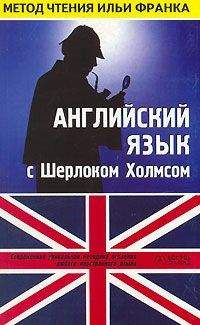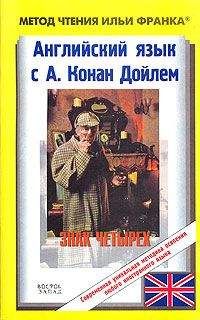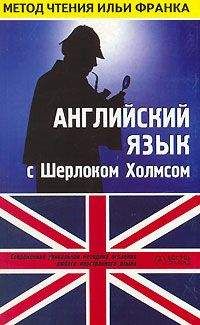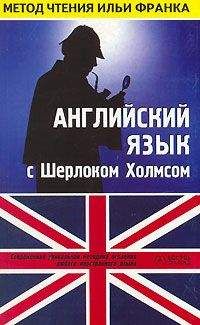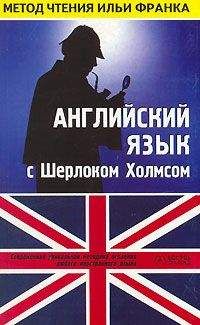“‘At least,’ said he, ‘you will not have me arrested at once. It would be to your advantage as well as mine if I might leave the house for five minutes.’
“‘That you may get away (чтобы ты убежал), or perhaps that you may conceal what you have stolen (или спрятал то, что украл),’ said I. And then, realizing the dreadful position in which I was placed (затем, осознавая ужасное положение, в котором я оказался), I implored him to remember that not only my honor (я /стал/ заклинать его вспомнить о том, что не только моя честь) but that of one who was far greater than I was at stake (но и честь гораздо более высокого лица поставлена на карту); and that he threatened to raise a scandal (что он грозил скандалом) which would convulse the nation (который потрясет /всю/ нацию). He might avert it all if he would but tell me (он может предотвратить все это, если только скажет мне) what he had done with the three missing stones (что он сделал с тремя пропавшими камнями).
“‘You may as well face the matter (посмотри на дело прямо = осознай свое положение),’ said I; ‘you have been caught in the act (ты пойман на месте преступления), and no confession could make your guilt more heinous (и признание не сделает твою вину более тяжелой; heinous — отвратительный, мерзкий, гнусный, ужасный). If you but make such reparation as is in your power (если ты только попытаешься сделать все, что в твоих силах, чтобы исправить ситуацию; reparation — компенсация, возмещение; исправление, заглаживание /вины/: to make reparation for a wrong — загладить вину), by telling us where the beryls are (рассказав нам, где находятся бериллы), all shall be forgiven and forgotten (все будет прощено и забыто; to forgive; to forget).’
threatened [Ɵretnd], guilt [ɡɪlt], heinous [ˈheɪnǝs]
“‘That you may get away, or perhaps that you may conceal what you have stolen,’ said I. And then, realizing the dreadful position in which I was placed, I implored him to remember that not only my honor but that of one who was far greater than I was at stake; and that he threatened to raise a scandal which would convulse the nation. He might avert it all if he would but tell me what he had done with the three missing stones.
“‘You may as well face the matter,’ said I; ‘you have been caught in the act, and no confession could make your guilt more heinous. If you but make such reparation as is in your power, by telling us where the beryls are, all shall be forgiven and forgotten.’
“‘Keep your forgiveness for those who ask for it (приберегите свое прощение для тех, кто в нем нуждается: «просит»),’ he answered, turning away from me with a sneer (ответил он, отвернувшись от меня с усмешкой).
“I saw that he was too hardened for any words of mine to influence him (я видел, что он слишком ожесточен, чтобы какие-либо мои слова могли повлиять на него; to harden — делать/ся/ твердым; бесчувственным, бессердечным; ожесточать). There was but one way for it (оставался лишь один выход). I called in the inspector and gave him into custody (я пригласил инспектора и передал Артура под стражу). A search was made at once not only of his person (немедленно был проведен обыск не только Артура) but of his room and of every portion of the house (но и его комнаты и каждого уголка в доме; portion — часть) where he could possibly have concealed the gems (где он мог бы спрятать драгоценные камни); but no trace of them could be found (но их не удалось обнаружить: «ни следа их не было найдено»), nor would the wretched boy open his mouth for all our persuasions and our threats (а негодный мальчишка не раскрывал рта, несмотря на все наши убеждения и угрозы).
“This morning he was removed to a cell (сегодня утром его отправили в камеру; to remove — удалять), and I, after going through all the police formalities (а я, исполнив все полицейские формальности), have hurried round to you (поспешил к вам) to implore you to use your skill in unravelling the matter (чтобы умолять вас применить свое искусство для раскрытия этого дела; to unravel — распутывать /нитки/; распутываться; разгадывать /тайну и т. д./). The police have openly confessed that they can at present make nothing of it (в полиции открыто признались, что в настоящее время сделать ничего не могут; to make nothing of — не понять что-либо, не разобраться в чем-либо). You may go to any expense which you think necessary (можете делать любые расходы, которые посчитаете необходимыми). I have already offered a reward of 1000 pounds (я уже предложил вознаграждение в тысячу фунтов). My God, what shall I do (Боже, что мне делать)! I have lost my honor, my gems, and my son in one night (я потерял честь, драгоценные камни и сына в одну ночь). Oh, what shall I do (о, что мне делать)!”
custody [ˈkʌstǝdɪ], wretched [ˈreʧɪd], persuasion [pǝˈsweɪʒ(ǝ)n]
“‘Keep your forgiveness for those who ask for it,’ he answered, turning away from me with a sneer.
“I saw that he was too hardened for any words of mine to influence him. There was but one way for it. I called in the inspector and gave him into custody. A search was made at once not only of his person but of his room and of every portion of the house where he could possibly have concealed the gems; but no trace of them could be found, nor would the wretched boy open his mouth for all our persuasions and our threats.
This morning he was removed to a cell, and I, after going through all the police formalities, have hurried round to you to implore you to use your skill in unravelling the matter. The police have openly confessed that they can at present make nothing of it. You may go to any expense which you think necessary. I have already offered a reward of 1000 pounds. My God, what shall I do! I have lost my honor, my gems, and my son in one night. Oh, what shall I do!”
He put a hand on either side of his head (он схватился за голову: «приложил руку к каждой стороне головы») and rocked himself to and fro (и стал раскачиваться из стороны в сторону; to and fro — туда и сюда, взад и вперед; из стороны в сторону, в разные стороны), droning to himself like a child (что-то бормоча, как ребенок; drone — трутень; to drone — гудеть, жужжать; бубнить, монотонно говорить) whose grief has got beyond words (который не может выразить свое горе: «чье горе зашло за пределы слов = чье горе вне слов»).
Sherlock Holmes sat silent for some few minutes (Холмс сидел молча несколько минут), with his brows knitted and his eyes fixed upon the fire (нахмурив брови и устремив взгляд на огонь; to knit — вязать; соединять/ся/, скреплять/ся/; хмурить /брови/).
“Do you receive much company (вы принимаете много гостей = у вас часто бывают гости)?” he asked.
“None save my partner with his family (нет, никого не бывает, кроме моего компаньона с семьей) and an occasional friend of Arthur’s (и иногда друзей Артура). Sir George Burnwell has been several times lately (сэр Джордж Бэрнвелл был недавно несколько раз; lately — недавно; за последнее время, в последнее время, на днях). No one else, I think (больше никого, пожалуй).”
“Do you go out much in society (а вы часто бываете в обществе)?”
“Arthur does (Артур — да). Mary and I stay at home (мы с Мэри сидим дома). We neither of us care for it (ни мне, ни ей это /выход в свет/ не интересно).”
knitted [ˈnɪtɪd], company [ˈkʌmpǝnɪ], society [sǝˈsaɪǝtɪ], neither [ˈnaɪðǝ]
He put a hand on either side of his head and rocked himself to and fro, droning to himself like a child whose grief has got beyond words.
Sherlock Holmes sat silent for some few minutes, with his brows knitted and his eyes fixed upon the fire.
“Do you receive much company?” he asked.
“None save my partner with his family and an occasional friend of Arthur’s. Sir George Burnwell has been several times lately. No one else, I think.”
“Do you go out much in society?”
“Arthur does. Mary and I stay at home. We neither of us care for it.”
“That is unusual in a young girl (это необычно для молодой девушки).”
“She is of a quiet nature (она тихого нрава). Besides, she is not so very young (кроме того, она не такая уж юная). She is four-and-twenty (ей двадцать четыре).”
“This matter, from what you say, seems to have been a shock to her also (эта история, судя по вашим словам, кажется, стала для нее потрясением).”
“Terrible (ужасным)! She is even more affected than I (она потрясена даже больше, чем я).”
“You have neither of you any doubt as to your son’s guilt (ни у нее, ни у вас нет никаких сомнений относительно виновности Артура)?”
“How can we have when I saw him with my own eyes with the coronet in his hands (какие у нас могут быть сомнения, когда я своими глазами видел, как он держал диадему в руках).”
“I hardly consider that a conclusive proof (я не могу считать это окончательным = неопровержимым доказательством). Was the remainder of the coronet at all injured (была ли повреждена оставшаяся часть диадемы)?”
“Yes, it was twisted (да, она была погнута).”
“Do you not think, then, that he might have been trying to straighten it (а вы не думаете, что, возможно, Артур пытался выпрямить ее; straight — прямой, неизогнутый)?”
unusual [ʌnˈju:ʒuǝl; ʌnˈju:ʒ(ǝ)l], affected [ǝˈfektɪd], straighten [streɪtn]
“That is unusual in a young girl.”
“She is of a quiet nature. Besides, she is not so very young. She is four‑and‑twenty.”
“This matter, from what you say, seems to have been a shock to her also.”
“Terrible! She is even more affected than I.”
“You have neither of you any doubt as to your son’s guilt?”
“How can we have when I saw him with my own eyes with the coronet in his hands.”
“I hardly consider that a conclusive proof. Was the remainder of the coronet at all injured?”
“Yes, it was twisted.”
“Do you not think, then, that he might have been trying to straighten it?”
“God bless you (что вы: «благослови вас Бог»)! You are doing what you can for him and for me (вы делаете все, что можете, для него и для меня). But it is too heavy a task (но это невозможно: «слишком трудная задача»). What was he doing there at all (что он вообще там делал)? If his purpose were innocent, why did he not say so (если его намерения были чистыми, почему он не сказал этого; innocent — невиновный, невинный; чистый)?”
“Precisely (совершенно верно). And if it were guilty, why did he not invent a lie (но если он был виновен, почему же он не солгал /в свое оправдание/: «не выдумал ложь»)? His silence appears to me to cut both ways (его молчание, по-моему, указывает и на то, и на другое; to cut both ways — быть обоюдоострым; иметь как положительные, так и отрицательные стороны). There are several singular points about the case (в этом деле есть несколько неясных деталей; singular — единичный; необычный, своеобразный, странный). What did the police think of the noise (что полиция подумала о шуме) which awoke you from your sleep (который разбудил вас)?”
